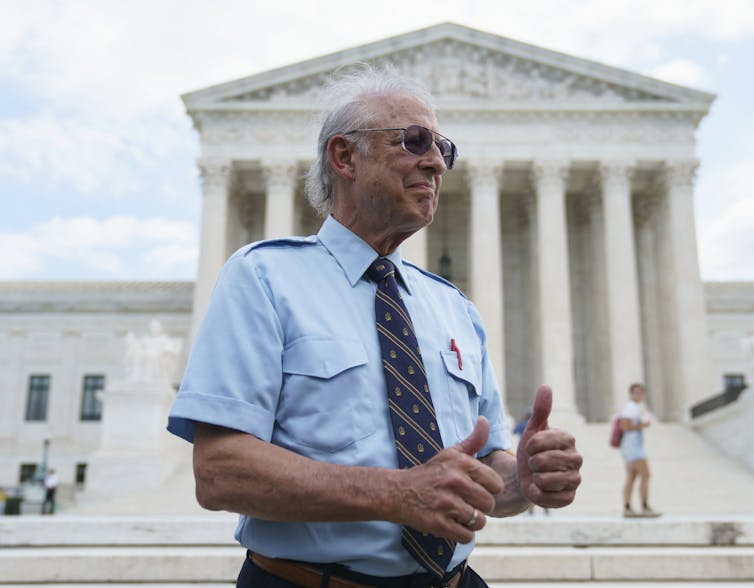First Major Second Amendment Case Before the Supreme Court in Over a Decade Could Topple Gun Restrictions

iStock.com/mphillips007

Connecting state and local government leaders
COMMENTARY | At issue is the right to carry handguns in public, not just keep them at home.
This article is republished from The Conversation under a Creative Commons license. Read the original article.
The stakes in one of the most significant Second Amendment cases in U.S. history are high.
The Supreme Court’s ruling in New York State Rifle & Pistol Association v. Bruen, expected by mid-2022, could declare a New York state restriction on carrying concealed handguns in public places unconstitutional.
Such a ruling in favor of the plaintiffs, which include a National Rifle Association affiliate, could loosen gun regulations in many parts of the country.
In my view as a Second Amendment scholar, this case is also noteworthy in that how the court reaches its conclusion could affect the Second Amendment analysis of all weapons laws in the future.
The court is set to hear oral arguments on Nov. 3.
Long on the books
In 1911, after an increase in homicides, New York instituted a handgun permitting system. In 1913, the permitting system was amended to address concealed carrying.
For more than a century, someone seeking to carry a concealed handgun for self-defense in the state has needed to file a permit application showing that they have what the law calls “proper cause.”
To obtain an unrestricted permit, applicants must “demonstrate a special need for self-protection distinguishable from that of the general community,” such as by showing they are being stalked.
New York’s attorneys defend this restrictive approach to issuing concealed carry permits as an effective means to reduce gun violence. In 2020, there were 43,592 gun deaths in the United States, including suicides and homicides. There are also over 80,000 non-fatal firearm injuries each year.
New York has some of the strictest gun laws in the country, and its homicide rate is below the national average.
The plaintiffs
Robert Nash and Brandon Koch were denied unrestricted concealed carry permits because a judge determined that they did not satisfy New York’s proper-cause standard.
Instead, Koch was issued a license to carry a concealed handgun for self-defense while traveling to and from work. Both plaintiffs’ licenses also permit them to carry concealed handguns for hunting and target practice, and for self-defense in areas not “frequented by the general public.”
Along with the NRA’s New York affiliate, Nash and Koch contend that these limitations on their ability to carry a concealed handgun violate their right to bear arms. They assert a broad view of the right to carry a handgun, one that extends virtually “whenever and wherever” the need for self-defense might arise.
New York’s law defies that conception of the Second Amendment.
The Heller ruling’s muted effects
In considering Bruen, the Supreme Court will focus on the meaning of an important precedent: District of Columbia v. Heller.
When the Supreme Court issued its Heller ruling in 2008, a 5-4 majority struck down Washington, D.C.‘s ban on the possession of handguns in the home. The court held for the first time that the Second Amendment protects an individual’s right to keep and bear arms.
Writing for the majority, the late Justice Antonin Scalia declared that the “central component” of the Second Amendment was not a “well regulated Militia,” but rather “the inherent right of self-defense.”
But the majority’s decision included cautionary language that lower-court judges have since relied on to uphold gun laws.
“The right secured by the Second Amendment is not unlimited” and is “not a right to keep and carry any weapon whatsoever in any manner whatsoever and for whatever purpose,” Scalia wrote. His opinion even contained a list of “presumptively lawful regulatory measures,” such as restrictions on the possession of firearms by felons or bans on carrying them in sensitive places like schools and government buildings.
The NRA and other gun rights supporters have bristled at the general acceptance by judges of the constitutionality of laws restricting firearm use.
That discontent culminated in Bruen.

More and more states have allowed concealed handguns
In 1980, most Americans lived in places that either banned concealed carry or had a New York-style “proper cause” permitting regime. An NRA push beginning in the late 1980s loosened public carry laws around the country.
In states where gun rights advocates possess relatively little clout, they hope that Bruen will accomplish through the courts what they have failed to accomplish through the political process.
Today, New York is one of eight states requiring that people seeking to carry concealed handguns have a “proper” or “good” cause. California, Delaware, Hawaii, Maryland, Massachusetts, New Jersey and Rhode Island have similar laws on the books.
If the court strikes down New York’s law, Americans in those states could expect an increase in the number of people legally carrying handguns in their communities. Anyone who wants to carry a concealed handgun would have an easier time doing so.
A 'text, history and tradition test’
Bruen could also be a turning point for how judges evaluate all Second Amendment cases – whether they’re about assault weapons, tasers or felon-in-possession offenses.
Until now, judges have generally assessed whether such restrictions are justified by current public safety concerns.
Many gun rights advocates are asking the Supreme Court to reject that approach. Instead, they want judges to decide cases on the sole basis of history and tradition unless the judiciary’s interpretation of the text of the Second Amendment resolves the issue. This is known as the “text, history and tradition” test.
Justice Brett Kavanaugh is credited with first articulating this test in a dissent he issued prior to his rise to the Supreme Court.
Justices Clarence Thomas, Neil Gorsuch and Amy Coney Barrett all have embraced similar judicial philosophies to some degree.
But there’s a catch: Guns have always been regulated in America.
New York’s regulation has been on the books for over a century and had a legacy that extended back even further.
If the justices abandon a conventional approach for the text, history and tradition test, I would expect a new round of lawsuits over weapons laws that have already survived prior court challenges. Gun rights advocates would likely, for example, sue over restrictions on large-capacity magazines or safe storage requirements in places where those issues have already been resolved.
This litigation would call on judges to rule on the sole basis of a difficult historical exercise: comparing modern laws addressing modern guns and contemporary gun violence to the laws, practices and weapons of a bygone era.
Trump’s justices may tip the scales
The court has three main options.
It could uphold New York’s law. It could strike it down. Or it could find a middle ground, such as issuing a narrow ruling that punts big questions about gun restrictions down the road.

Chief Justice John Roberts has steered his colleagues toward narrow rulings before. But he will hold little sway if the three justices former President Donald Trump appointed team up with Samuel Alito and Clarence Thomas, the court’s two other conservatives, on a far-reaching majority opinion.
Trump conferred with the NRA before nominating Gorsuch, Kavanaugh and Coney Barrett – all of whom received the gun group’s blessing.
The ruling will underscore the significance of their presence on the court.
[Understand what’s going on in Washington. Sign up for The Conversation’s Politics Weekly.
Eric Ruben is assistant professor of law at Southern Methodist University.

NEXT STORY: Lack of Diversity in the Government Workforce Can Lead to Retention and Trust Issues


